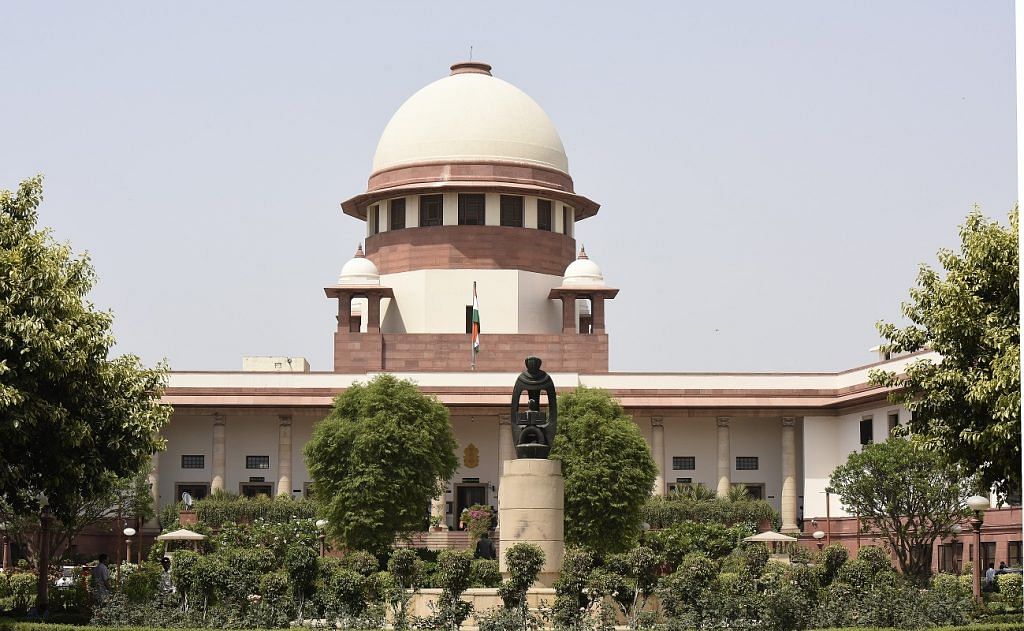Judges have asked CJI for an appropriate bench to decide if a three-judge bench can overturn a previous judgment by a bench of similar strength.
New Delhi: Two separate benches of the Supreme Court decided to ask Chief Justice of India Dipak Misra Thursday to constitute an “appropriate” bench to decide whether a three-judge bench can declare “per incuriam” a judgment delivered by another bench of similar strength.
In layman’s language, “per incuriam” refers to a judgment that is delivered without taking into consideration available, relevant facts, or following due care. In simpler terms, it’s a careless judgment.
At the heart of the controversy are the divergent views within the Supreme Court on whether proceedings under Section 24(2) of the Right to Fair Compensation and Transparency in Land Acquisition, Rehabilitation and Resettlement Act, 2013 – colloquially known as the new land acquisition Act – are said to have lapsed.
On 24 January 2014, in Pune Municipal Corporation vs Harakchand Misirimal Solanki, a three-judge bench comprising Justices R.M. Lodha, Madan B. Lokur and Kurian Joseph settled the law, holding that compensation in lieu of cost of the land, unless paid into the account of the land owner, couldn’t effectively be taken as payment made to him.
Thus, even if the compensation amount has been deposited in the government treasury, it can’t be held to be equivalent to compensation paid to the land owners/persons interested, the bench ruled. Several other judgments followed this settled principle of law.
If this judgment is declared “per incuriam”, something that another bench has now sought, it will lead to all cases decided on the basis of Pune judgment being reopened.
Split verdict
In its judgment of 8 February this year, a three-judge bench comprising Justices Arun Mishra, Adarsh Kumar Goel and Mohan M. Shantanagoudar decided to revisit the issue.
However, there was a twist in the tale: when two of the judges – Mishra and Goel – wanted to declare the Pune Municipal Corporation judgment “per incuriam”, Shantanagoudar dissented, saying “the (Pune) judgment cannot be said to have been through lack of care, or out of ignorance of certain important factors”.
He, however, also said that the judgment “may have to be reconsidered by a larger bench”, since it was decided by a bench of three judges. “The Registry is directed to place the papers before the Hon’ble Chief Justice of India for appropriate orders,” his judgment said.
But, the majority judgment, penned by Mishra, went to the extent of explaining the “principle of per incuriam”.
Citing a 1991 judgment of the SC, the bench said, “Incuria literally means ‘carelessness’. In practice, ‘per incuriam’ appears to mean ‘per ignoratium’.”
Thus, it quoted from the judgment to say that “the concept of ‘per incuriam’ signifies those decisions rendered in ignorance or forgetfulness of some inconsistent statutory provisions, or of some authority binding on the Court concerned”.
Another example of SC fallacy
Legal experts say if the Pune judgment is overturned, it would have a cascading effect on several land acquisition cases decided following the law as settled by it.
More importantly, Thursday’s orders by the benches of Justices Mishra and Goel, if they can be termed as such, once again expose the fallacious manner in which the highest court of the land has been functioning since the last several months.
While the last word on the issue will possibly be said at a later stage, many believe that the short but excellent dissent by Justice Mohan M. Shantanagoudar in the Indore Development Authority case could hold the key to the answer.
The fact that both Justices Lokur and Joseph were part of the 2014 bench that settled the law on Section 24(2) and have every reason to be upset over breach in judicial propriety by another bench to dub their judgment “per incuriam” doesn’t need too much highlighting.
By the way, there are instances of one bench, led by the CJI himself, hearing part-heard matters pending before other benches and proceeding to pass orders, in complete disregard of judicial discipline and propriety.
